
| Institute brings opportunity home to Southside by Susan B. Felker |
|
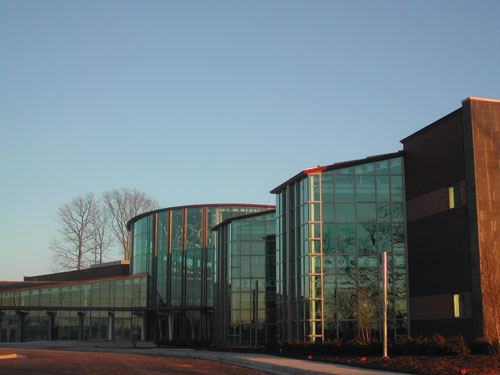
|
Senators, congressmen, members of Virginia's General Assembly, and Gov. Mark Warner have all praised the Institute for Advanced Learning and Research (IALR) in Danville, Va., for its innovative approach to stimulating economic development by locating Virginia Tech research labs there. Just a dream five years ago, IALR has quickly achieved regional and national recognition with an award from the Southern Growth Policies Board and selection as one of three finalists for a federal Excellence in Economic Development Award in 2005.
Kudos aside, what does IALR mean to the people of Southside, who have seen thousands of jobs leave the area in the past 15 years? Is the institute changing lives?
|
|
Stemming the population exodus
Even before its impressive steel and glass building formally opened in June 2004, IALR served as a magnet for businesses relocating to the area. Today, the institute is beginning to fulfill a promise to area residents: bringing their children who have graduated from college back to the area.
For Danville native and third-generation Hokie Pamela Divine (communication '04), her job as an event planner for the Institute Conference Center at IALR meant that she could return to the hometown she loves and find an appropriate job when she graduated.
"When I first enrolled at Virginia Tech, I thought I would have to move away when I graduated if I wanted an interesting career, even though I really wanted to live in Danville. Every root I have is here and I love it here," Divine says. "Even my parents didn't feel there was a future for me in Danville as a communication major."
As she grew up, she saw the decline of the tobacco industry and the exodus of manufacturing jobs from the region. New jobs seemed to be developing only in the retail sector at the new Piedmont Mall, in medicine, and in new restaurants. "I didn't know many people with college degrees, other than teachers, who worked in Danville."
|
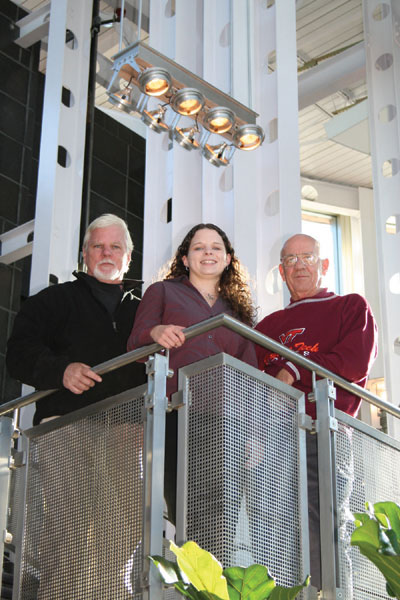 Three generations of Southside Hokies:
Three generations of Southside Hokies:
Pam Divine '04; her father, Al Divine '75 (left);
and her maternal grandfather, Robert Stinespring '60.
|
Divine was in her first year at Tech when a family friend called to tell her about IALR, explaining that this joint project among Virginia Tech, Averett University, the Future of the Piedmont Foundation, Danville Community College, and other local and regional partners was a strategic effort to develop the area's economy and create jobs. The friend sent Divine's resume to IALR. She began working at the institute as an intern in the summer of 2003 and continued doing so at every opportunity until graduation.
When Divine received her degree in 2004, her job was waiting for her. "I came back to a job that was good enough for me to become independent from my parents financially, buy a house, and get involved playing in the Danville Symphony in my spare time," she says.
For IALR's Director of Commercialization and Enterprises Hayward Majors, joining the staff on a one-year contract also meant returning home. After growing up in Danville, he earned his bachelor's degree at Duke University and his law degree at the University of Virginia.
"After I graduated, I went to New York City in the fall of 2001 to practice law and remained there for three and one-half years," says Majors. "As is normal in a big corporate law firm, I was wondering what my next step would be."
|
| He wanted to move back to the South but had no particular place in mind. "I was thinking of Charlotte when IALR's Executive Director Tim Franklin (Ph.D. educational research and policy studies '92) contacted me about this opportunity," Majors recalls. "I was a little surprised by the thought of coming back to Danville because I didn't think the right options were here for me. The more I thought about it, the more I thought IALR offered a great opportunity, not only career-wise, but also in helping to define what my career was going to be."
Majors' job at IALR involves more than legal work. He works with the conference center, collaborating with its general manager on the strategic plan. "We are also starting up the commercial side of our research labs. For example, the seven-post rig for automotive testing at Virginia Institute for Performance Engineering and Research will be attractive to outside clients." Majors has been helping the research labs set up business plans and procedures to contract with businesses.
A big part of Majors' position involves the commercialization of intellectual property created in the research labs. He has developed policies on intellectual properties and a technology-transfer mechanism for spinning off discoveries into new businesses.
"We need some good revenue coming in," Majors notes. "Tech transfer and research contracts are two good sources of potential income."
For both Majors and Divine, family plays an important part in the high quality of life they have achieved by returning to Danville.
Divine's return to her hometown allows her to spend valuable time with her family. "I was able to help Mom take care of my grandparents when they became ill. I get to see my only niece and my older brother. I take a Pilates class once a week with my 71-year-old grandmother. My little brother is now looking at moving back to the Danville area, too."
Majors knew that when he left New York, he wanted to be within a short of drive of his family but didn't anticipate that he would wind up in the same city. "This has been one of the greatest things about my new job," he says. "My parents, sister, and brother-in-law are all here. Being able to collaborate with the same people I've known all my life in this community is a great experience. It brings things to a whole new level."
His family enjoys having him back. "I no longer have to deal with the hassle of flying in for every holiday. And it's great to talk business with my father and get into discussions with him that don't work well over the phone."
Divine and Majors are but two of the 46 full-time IALR employees and four full-time Virginia Tech employees working at the institute in jobs that didn't exist before Tech began collaborating with local and regional partners to take a proactive approach to economic development for Southside. Six staff members have roots in Southside and moved back to work there. Another 17, all college graduates, moved to the area after landing jobs at IALR. The rest are local residents who didn't have to move away to get good jobs. The 50 people on the payroll live in counties across Southside, although most are residents of Danville or Pittsylvania County. Three commute from North Carolina--the border is just a few miles away.
The roots of change
All in all, IALR's progress to date is a respectable start for an effort still in its infancy. "It was only in 2000 that the original partners came together to plan IALR," says E. Linwood Wright, chair of the institute's board of trustees. The Future of the Piedmont Foundation, which he also chairs, approached Virginia Tech with concerns about the adverse effects of the declining tobacco and manufacturing economy on Southside's future.
Funding for the project has come from federal, state, and local sources, as well as from the tobacco settlement funds disbursed by the Virginia Tobacco Indemnification and Community Revitalization Commission.
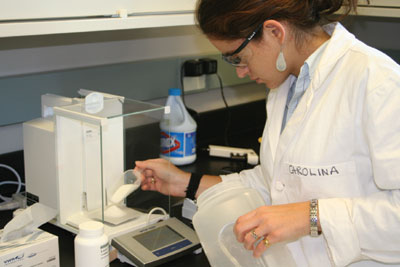
Tech's Outreach and International Affairs formed the Southside Implementation Team and recruited faculty who are passionate about reversing the growing unemployment in the region. They identified Tech's role in three primary IALR thrusts. First, Tech would plan and help implement next-generation Internet infrastructure, called e-Dan, that would enable researchers and businesses to have high-speed access to partners--or clients--worldwide. Second, Tech would work with IALR to set up research labs focusing on developing new technologies that would strengthen already existing regional industries and attract new ones to Danville. Third, Tech would add graduate education programs in subjects related to the research labs to complement offerings by Averett University and Danville Community College, offering seamless pathways from associate to doctorate degrees, which would create a highly trained workforce to attract businesses to the area.
Virginia Tech's involvement represents a new model for the land-grant university, one that places research at the core of a model for an innovation economy. The university will be taking this model to several locations around Virginia, customizing plans for research labs to regional economies, according to Tech Director of Economic Development Ted Settle. These centers were factored into the governor’s 2006-07 budget.
An editorial in the Richmond Times-Dispatch on Dec. 5, 2005, focused on the institute's success:
The IALR method already has begun to amass dividends. Luna Innovations has set up a division in an old tobacco warehouse to take advantage of the institute's nanotechnology research. Sterling's EIT, another high-technology firm, also will locate operations in Southside because of work done at IALR. Exploration in disciplines as disparate as polymers and automobile engines (of interest to NASCAR) has stimulated other corporate interest.
|
|
This sense of excitement attracted Curtis Callaway, communications manager, to IALR. "I was very intrigued," he says. "Here was an organization that was positioning itself to help bring about an economic transformation in a region that was experiencing economic decline.
"I was able to join the staff in the early stages, so it's been a unique opportunity to be involved with something as important as this. It's also an amazing professional opportunity to work in an enterprise that is already in the public eye on a regional and state level and is starting to gain national attention."
To Callaway, the project is the center of "a grand economic development strategy for rural Virginia. When we are successful, we then become a national model for rural economic development and that's an amazing experience--to be part of the team that's trying to make a difference on a grand scale."
|
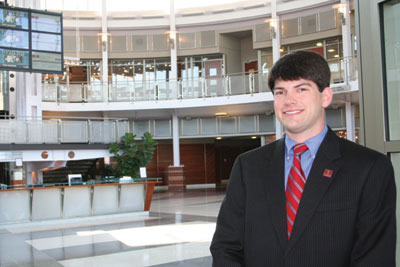
Communications manager Curtis Callaway
in the IALR lobby.
|
|
Growing into its mission
Helping the institute become more visible, Callaway believes, is its "great mission. We've been able to develop an amazing staff, and we all are focused on that mission. And we're involved in our jobs, but we're also giving back to the community through volunteer work and are trying to help this region grow."
Part of the institute's plans for future growth include new education programs that will begin at IALR in the spring. For Divine, the programs will help keep her close to her roots. "I'm really excited about the development and growth of the academic part of IALR. I'm looking forward to getting my master's degree here. I would hate to have to leave to get an advanced-degree."
Several universities including Virginia Tech, University of Virginia (U.Va.), Florida State University, Oklahoma State University, University of Tennessee, University of Tennessee Space Institute, and East Carolina University are pursuing offering advanced-degree programs at the institute. Virginia Commonwealth University will have a bachelor's in nursing program. Both Tech and U.Va. are developing certificate degree programs and non-credit training.
The IALR facility now includes 93,000 square feet of research, classroom, conference, and office space equipped with state-of-the-art information technology. It houses more than 25 classrooms and computer labs, including a smaller version of Tech's Math Emporium, a great hall that seats 750, a 135-seat executive auditorium, and several high-end business conference rooms.
|
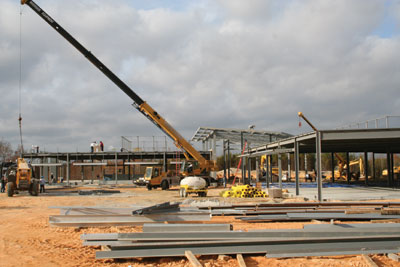
Ground was broken in November
for IALR's new research building.
|
Other facilities that are available to the whole community include a cybercafé, an e-Library, and a multimedia development center. Construction of a new research building adjacent to the current structure is now underway.
Board chair Wright, a Danville native and former mayor who has lived there for more than 50 years, sees this progress in creating research and educational opportunities, as well as jobs, as just the beginning of the institute's impact on the region.
"I am totally committed to this project, which we think will impact literally every group of people in the region. I told someone recently that I considered the institute the most important thing I've worked on in my life, and I've just played a bit role in getting it up and running. It's a great project and a new approach to the economic problems Southside is facing with the decline of manufacturing in the area.
More information about the Institute for Advanced Learning and Research is online at www.ialr.org or call 434/766-6700.
|
Hokies at IALR
Not only is the Institute for Advanced Learning and Research helping to keep Southside natives in the area, it's also providing a home for Hokies. Virginia Tech alumni currently contributing to the far-seeing project include:
Leigh A. Allgood (communication '03), outreach program assistant
Pam Divine (communication '04), event planner, Institute Conference Center
Kelly Finney (business information technology/e-business and marketing management '04), information technology/audiovisual specialist
Timothy Franklin (Ph.D. educational research and policy studies '92), executive director
Angela P. Funderburk (psychology '98), departmental assistant
Paul Patricio (mechanical engineering '98; M.S. '03), test engineer, Virginia Institute for Performance Engineering and Research
Rachel Reynolds (business information technology/ e-business '04), administrative liaison, Southern Piedmont Technology Council
Beverly Turner (hospitality and tourism management '98), coordinator of institute conference programs
Susan B. Felker coordinates public relations and marketing
for Outreach and International Affairs at Virginia Tech.
|
|
|